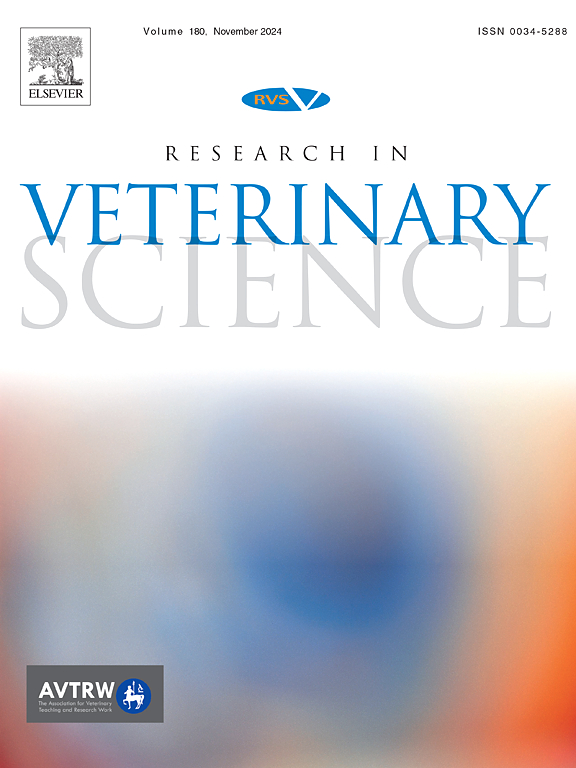Potential immunoprophylactic use of a multi-epitope protein of CD4+ and CD8+ T cells against visceral leishmaniasis in Balb/c mice
IF 1.8
3区 农林科学
Q1 VETERINARY SCIENCES
引用次数: 0
Abstract
Diseases caused by parasites of the genus Leishmania are considered neglected infections. Visceral leishmaniasis (VL) is the most severe form of the disease, with a high annual incidence worldwide. In Brazil, dogs play an essential role as reservoirs, exhibiting a high concentration of parasites on their skin and no clinical signs, making them potential transmitters of the disease. Given the need for an efficient method to reduce the incidence of the disease, this study aimed to develop a gene encoding a chimeric protein with multiple epitopes that target both CD4+ and CD8+ T lymphocytes. Together with the MPLA adjuvant, the chimeric protein has the potential to compose a vaccine formulation against canine visceral leishmaniasis. Using an immunoinformatics analysis tool, the prediction of specific epitopes for CD4+ and CD8+ T lymphocytes was performed on sequences of hypothetical proteins previously identified in the immunoproteome of Leishmania (Leishmania) infantum parasites. The vaccine formulation was evaluated in Balb/c mice, and the chimeric protein, in association with the adjuvant, induced a protective response with a polarized TH1 profile against the Leishmania parasite, characterized by high levels of IFN-γ, TNF-α, and low levels of IL-10. Additionally, the vaccinated animals showed a significant reduction in parasite burden in the liver, spleen, and bone marrow and draining lymph nodes of the paws compared to the control groups. Thus, the chimeric protein described here has the potential to be used in a vaccine formulation against canine leishmaniasis.

CD4+和CD8+ T细胞多表位蛋白对Balb/c小鼠内脏利什曼病的潜在免疫预防作用
由利什曼原虫属寄生虫引起的疾病被认为是被忽视的感染。内脏利什曼病(VL)是该病最严重的形式,在世界范围内的年发病率很高。在巴西,狗作为宿主发挥着至关重要的作用,它们的皮肤上有高浓度的寄生虫,但没有临床症状,这使它们成为疾病的潜在传播者。鉴于需要一种有效的方法来降低疾病的发病率,本研究旨在开发一种编码具有多个表位的嵌合蛋白的基因,该基因可靶向CD4+和CD8+ T淋巴细胞。与MPLA佐剂一起,嵌合蛋白具有组成犬内脏利什曼病疫苗制剂的潜力。利用免疫信息学分析工具,对先前在利什曼原虫(利什曼原虫)婴儿寄生虫免疫蛋白质组中鉴定的假设蛋白序列进行了CD4+和CD8+ T淋巴细胞特异性表位的预测。在Balb/c小鼠中对疫苗制剂进行了评估,嵌合蛋白与佐剂结合,诱导了针对利什曼原虫的保护反应,具有极化TH1谱,其特征是高水平的IFN-γ、TNF-α和低水平的IL-10。此外,与对照组相比,接种疫苗的动物在肝脏、脾脏、骨髓和爪子的引流淋巴结中的寄生虫负担显著减少。因此,本文描述的嵌合蛋白具有用于犬利什曼病疫苗制剂的潜力。
本文章由计算机程序翻译,如有差异,请以英文原文为准。
求助全文
约1分钟内获得全文
求助全文
来源期刊

Research in veterinary science
农林科学-兽医学
CiteScore
4.40
自引率
4.20%
发文量
312
审稿时长
75 days
期刊介绍:
Research in Veterinary Science is an International multi-disciplinary journal publishing original articles, reviews and short communications of a high scientific and ethical standard in all aspects of veterinary and biomedical research.
The primary aim of the journal is to inform veterinary and biomedical scientists of significant advances in veterinary and related research through prompt publication and dissemination. Secondly, the journal aims to provide a general multi-disciplinary forum for discussion and debate of news and issues concerning veterinary science. Thirdly, to promote the dissemination of knowledge to a broader range of professions, globally.
High quality papers on all species of animals are considered, particularly those considered to be of high scientific importance and originality, and with interdisciplinary interest. The journal encourages papers providing results that have clear implications for understanding disease pathogenesis and for the development of control measures or treatments, as well as those dealing with a comparative biomedical approach, which represents a substantial improvement to animal and human health.
Studies without a robust scientific hypothesis or that are preliminary, or of weak originality, as well as negative results, are not appropriate for the journal. Furthermore, observational approaches, case studies or field reports lacking an advancement in general knowledge do not fall within the scope of the journal.
 求助内容:
求助内容: 应助结果提醒方式:
应助结果提醒方式:


